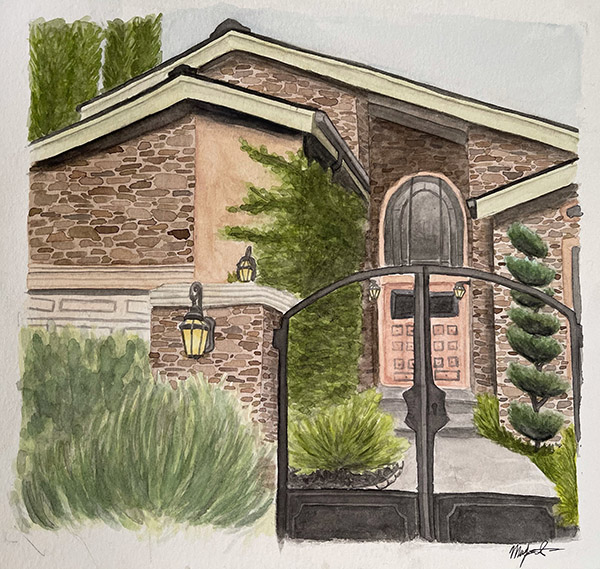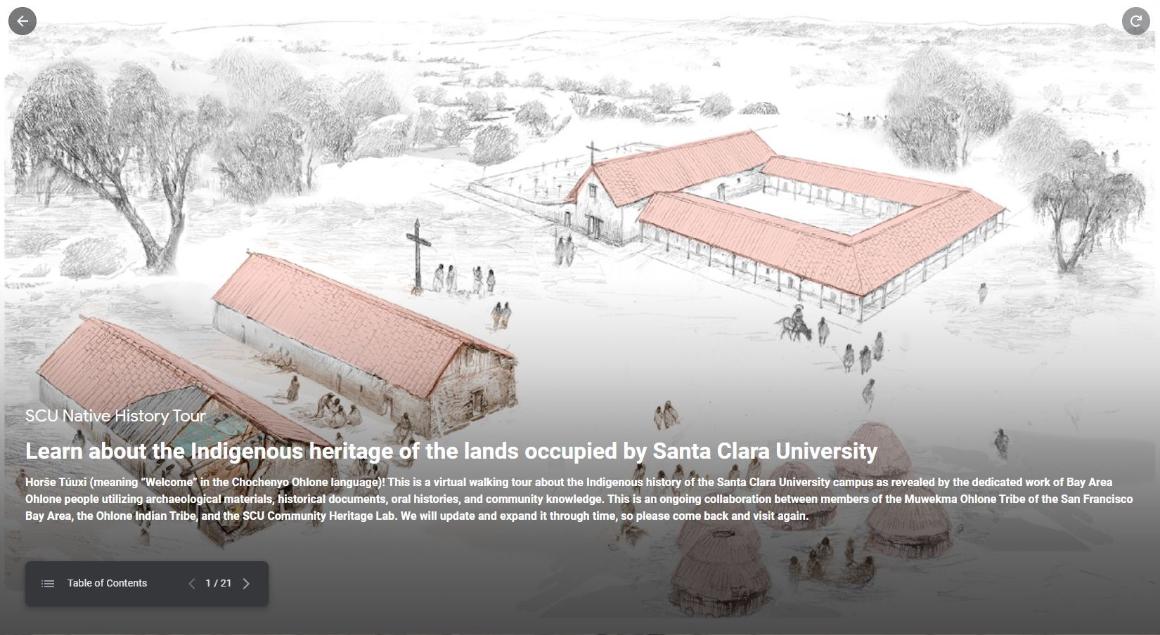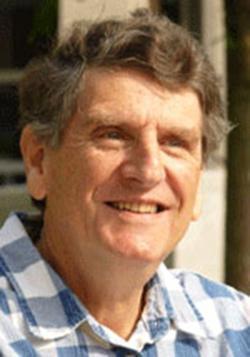| Trouble viewing this email? Read it online. |

| April 9, 2021 | Submit a Note |
 Exterior by Magdaline Schulte '21, Watercolor Painting, created Winter 2021 in Kelly Detweiler's ARTS 46: Basic Watercolor. Courtesy of the artist.
The song may be called April in Paris, but have you been to campus recently? April in Santa Clara is worthy of a nice tune… As you may have seen, last week I announced the addition of Kat Saxton (Biology and Public Health) to our Dean’s Office as an associate dean starting July 1. She has played an important role helping lead the University’s response to COVID-19 this past year, and will be a strong addition to our team. I am excited to have her join us! I want to extend my thanks to Julie Chang (English) for stepping into the AD role after it was vacated in 2019. She has been an integral part of our team these past couple years and will be missed. I wish her luck and success during her upcoming sabbatical. I’d like to encourage you all to contribute to the SCU in Quarantine: Our Pandemic Stories project being led by the Santa Clara Magazine and the University Library Archives & Special Collections. As we have reached the one-year mark of teaching and working remotely, this project is a way for our community to share how we have dealt with the unprecedented challenges and extraordinary change. These submissions will be housed in perpetuity in University Archives so that future historians may better understand how we got through this time, together yet apart. In the meantime, you may be finding the pandemic news disorienting, as I do — some news is great (vaccinations are going relatively well in Santa Clara County), some news not (infections are spiking around the world and there are worrisome virus variants circulating about). It gives me hope and encouragement to see students on campus and to imagine all of us being physically present there in the fall; I hope that helps you too! Sincerely, Daniel
Highlights

Matt Kroot (Anthropology), Amy Lueck (English), and Lee Panich (Anthropology) recently launched the SCU Native History Tour, which is hosted on the Community Heritage Lab media page. This tour was developed in collaboration with members of San Francisco Bay Area Ohlone communities and showcases the Indigenous history of the Santa Clara University campus. Clicking on this link will bring you to Google Earth, where you can take the tour using the arrow icons in the bottom left of the window to navigate. At most stops, you can click on the images above the text for a slideshow and/or further information from Ohlone representatives. Please feel free to share and use widely.

Marilyn Edelstein (English) just published a chapter called “(How) Should a Feminist Teach Lolita in the Wake of #MeToo?” in the edited collection Teaching Nabokov’s Lolita in #MeToo Era, edited by Elena Rakhimova-Sommers (Lexington Books, March 2021). In this essay, Marilyn reviews the development of feminist analyses of Lolita over the last 30 years and how these analyses shifted the critical conversation about the novel away from the narrator Humbert Humbert’s so-called romantic quest and/or his and Nabokov’s quest for “aesthetic bliss,” to, instead, a focus on Lolita “herself”—as victimized “girl-child”—and on the novel’s relationship to the real-world problems of child sexual abuse and rape. The essay explores the ethical and pedagogical challenges feminist teachers now face, in the midst of the #MeToo movement, in deciding whether to assign Lolita, and, if we do teach it, some ways in which we might help our students read it without being traumatized (or re-traumatized) by it and be able to balance analysis of Lolita’s brilliant language and aesthetic complexity with feminist analyses of its troubling subject matter.

Ryan Anderson (Anthropology) recently published a paper in Shore & Beach, along with co-authors Kiki Patsch (CSU Channel Islands), Charles Lester (UC Santa Barbara), and Gary Griggs (UC Santa Cruz), titled "Adapting to shoreline retreat: Finding a path forward." The paper examines the problem of shoreline retreat in California from a multidisciplinary perspective. Tackling a contentious issue, the paper concludes that planning now and aiming for some form of managed retreat "is far superior to a coastline of more 'lost neighborhoods,' riddled with the chaos of unmanaged retreat." Anderson also presented at the annual meeting of the Society for Economic Anthropology (SEA) in March on related work with his paper "Too valuable to retreat: The politics of sea-level rise, managed retreat, and coastal property values in California." In addition, he was invited for a guest lecture at Cal State University Channel Islands, where he gave a talk titled, "From paradise to property: Anthropological perspectives on beaches, coastal property, and rising seas." Finally, he published a short photo-essay in the Journal for the Anthropology of North America's "Snapshots" series that explores the human dimensions and meanings of coastal retention structures in California. Image: "South Jetty," Oceanside, California. Photo by Ryan Anderson, 2019.

Lindsay Halladay (Psychology & Neuroscience) published an invited peer-reviewed article in the Journal of Neurochemistry, "Advances in understanding meso‐cortico‐limbic‐striatal systems mediating risky reward seeking." Individuals suffering from substance use disorders or behavioral addictions tend to be less able to curtail addictive behaviors despite the aversive consequences associated with them; the article discusses the neural processes underpinning reward-seeking despite the risk of punishment and considers how behavioral assays in animals have been employed to provide insights into the neural mechanisms underlying addictive disorders.

The journal Research in Number Theory accepted the article by Ed Schaefer (Mathematics & Computer Science) and Carl Pomerance titled "Elliptic curves with Galois-stable cyclic subgroups of order 4." Carl Pomerance was the Halmos Visiting Professor in the Department of Mathematics and Computer Science during 2019-20. Paul Erdös was an eccentric and prolific mathematician. A mathematician who published with him is said to have an Erdös number of 1. Anyone who has published with such a mathematician has an Erdös number of 2, etc. As Pomerance published repeatedly with Erdös, Ed's Erdös number just dropped to 2. Image: Carl Pomerance

Cover image for The Gita in a Global World: Ethical Action in an Age of Flux Rohit Chopra (Communication) has published The Gita in a Global World: Ethical Action in an Age of Flux (Chenna: Westland Books/ Context, 2021). It is available for pre-order on Amazon and will be released Monday, April 12, 2021. The book argues that we now inhabit a new normative state of chronic global flux, which Chopra terms "crisis globalization." In light of this condition, which Chopra theorizes and describes, the book examines what the ancient Hindu and Indian text, the Bhagavad Gita, which is part of the epic, The Mahabharata, can tell us about the ethically appropriate response to the challenges posed by a wide range of matters—including global warming, inequality and suffering, pandemics, and the savage oppression of vulnerable groups. The interdisciplinary inquiry undertaken in the book is framed under three broad categories: action in the face of pervasive uncertainty; identity and difference; and war and violence. The book brings the Gita into conversation with Western philosophical perspectives in ethics, scholarship on late capitalist modernity, ideas of the free market, contemporary debates on identity, difference, and being, the legacies of war and violence in the twentieth and twenty-first centuries, developments in media, and the shifts in the contemporary landscape of global politics.
College of Arts and Sciences Calendar
|
| College of Arts and Sciences |
Questions? Contact Sandy Boyer |

